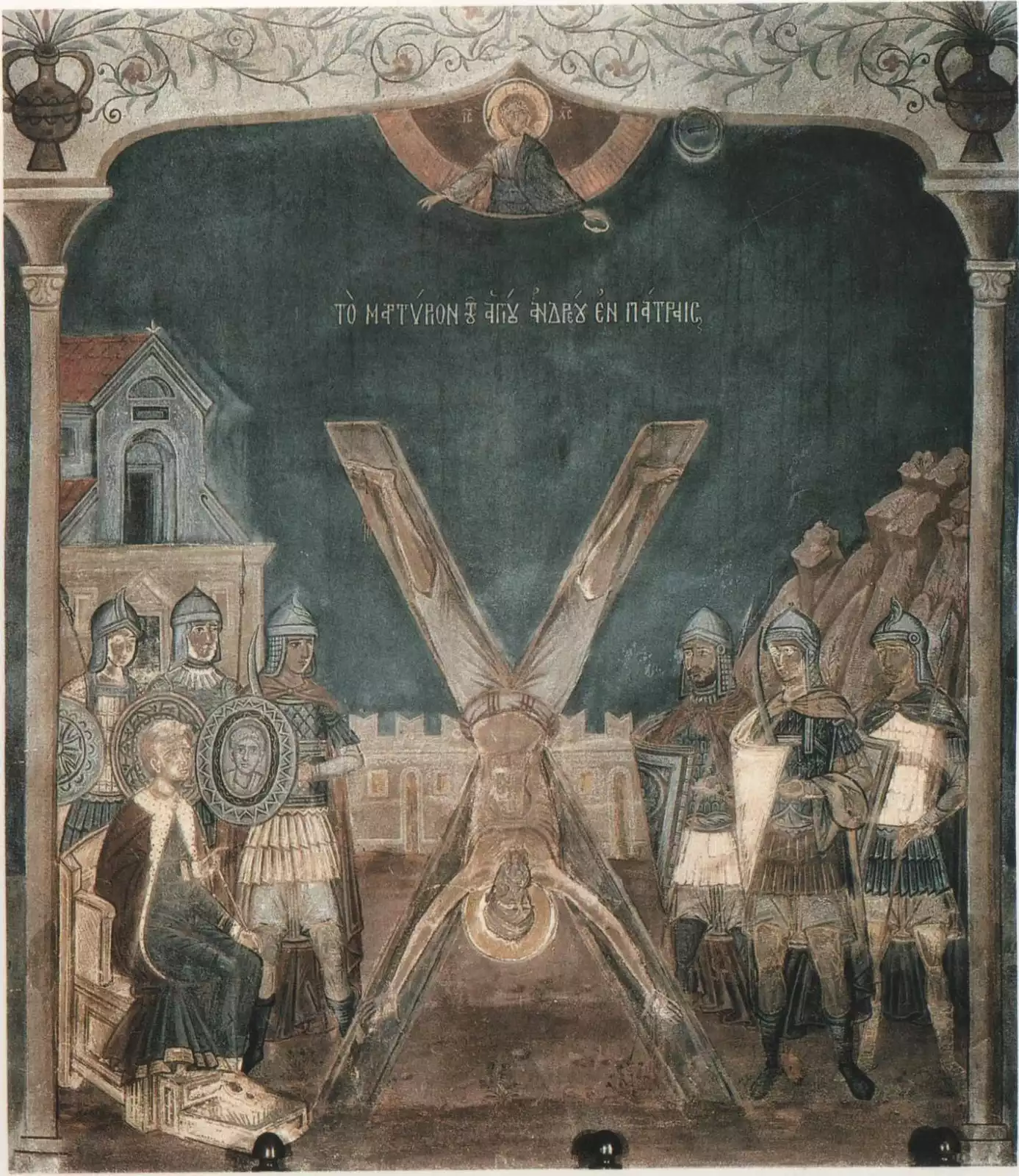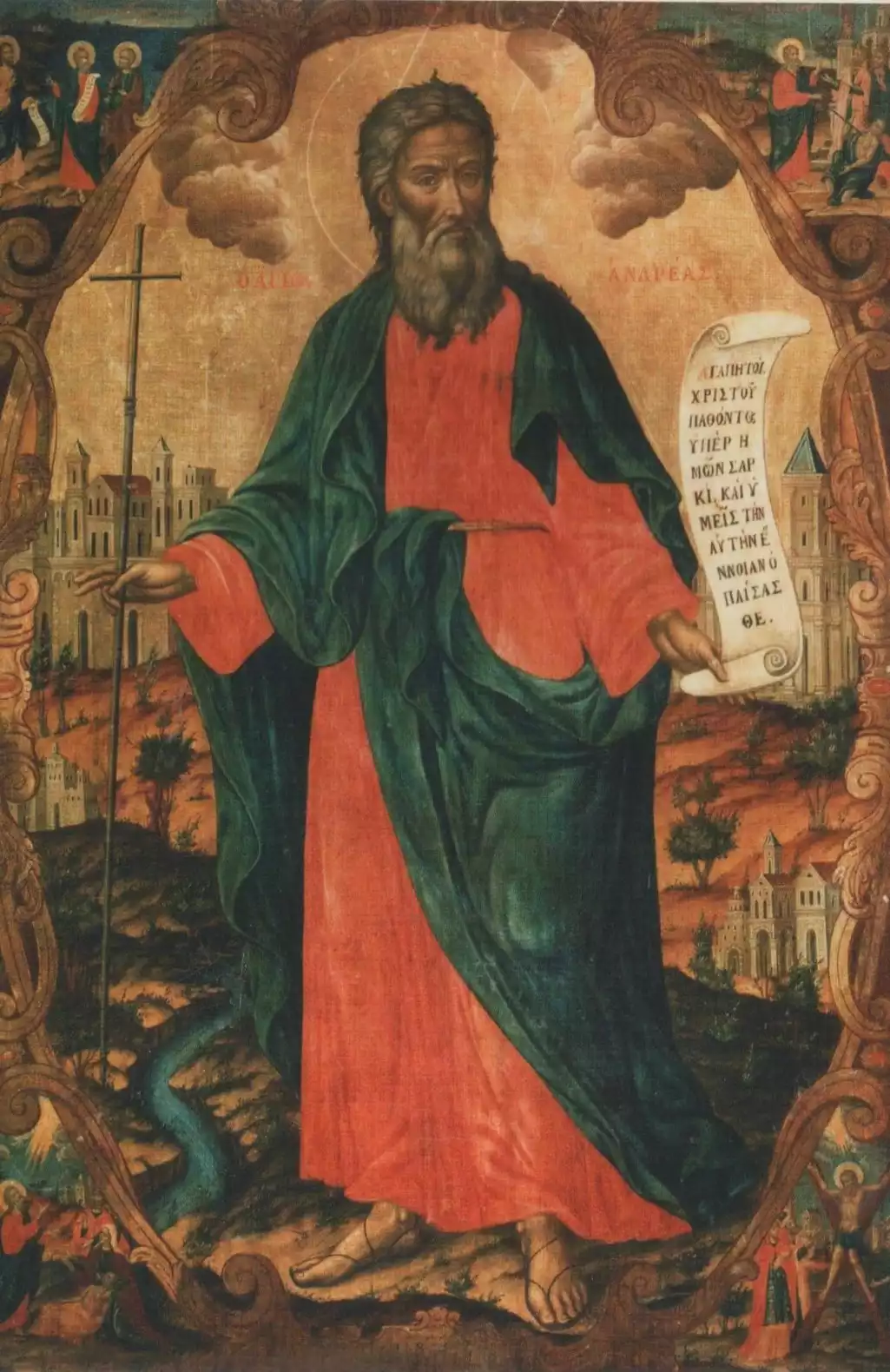
Early Life and Call to Apostleship
Saint Andrew’s early life, prior to his call to apostleship, was marked by simplicity and humility. Born in the early 1st century in Bethsaida, a town on the shore of the Sea of Galilee, he was the brother of Simon Peter, another significant apostle. Initially a disciple of John the Baptist, Andrew’s life took a transformative turn when he encountered Jesus. The Gospel of John narrates this pivotal moment, noting Andrew’s immediate recognition of Jesus as the Messiah. This encounter spurred Andrew to introduce his brother Peter to Jesus, thereby playing a crucial role in the formation of Jesus’ inner circle of followers.
Andrew’s decision to follow Jesus marked a radical shift in his life. From a fisherman, he became an apostle, dedicating himself to the teachings and mission of Jesus. His journey as an apostle was characterized by an unwavering commitment to spreading the message of Jesus, often in the face of adversity. This period of his life set the foundation for his later works and his enduring legacy as a key figure in the early Church.
Ministry and Teachings
Following his call to apostleship, Saint Andrew embarked on a journey of spreading the teachings of Jesus. The Gospels, while not providing an extensive account of Andrew’s individual acts, indicate his active involvement in the ministry of Jesus. He is often depicted as a figure of inquiry and understanding, posing questions that elicit deeper teachings from Jesus, as seen in the Gospel of John.
Andrew’s ministry extended beyond the life of Jesus. According to early Christian traditions, he traveled extensively to preach the Gospel. Regions such as Scythia, Greece, and areas around the Black Sea are often mentioned in connection with his missionary journeys. His approach to ministry was marked by a deep compassion and a commitment to reaching diverse communities. Andrew’s teachings, while rooted in the message of Jesus, adapted to the cultural contexts of the regions he visited, showcasing his ability to connect with varied audiences.
In these journeys, Saint Andrew not only spread the message of Christianity but also laid the groundwork for the establishment of several Christian communities. His efforts were instrumental in the early expansion of the Church, highlighting his role as a bridge between the teachings of Jesus and the wider world. The impact of his ministry can be seen in the numerous churches and Christian denominations that revere him as their patron saint.
Saint Andrew’s life and ministry offer profound insights into the early days of Christianity. His transformation from a fisherman to a dedicated apostle exemplifies the transformative power of faith and dedication. His teachings and journeys reflect the essence of apostolic mission and continue to inspire Christians worldwide.
Founder of the Ecumenical Patriarchate
Saint Andrew the Apostle is renowned for establishing the Ecumenical Patriarchate of Constantinople (now Istanbul), a cornerstone of the Eastern Orthodox Church. His apostolic mission in Byzantium laid the foundation for this significant Christian community, which evolved into a vital center of religious authority and learning. The Patriarchate’s influence extended throughout the Byzantine Empire, shaping religious and cultural narratives. Saint Andrew’s vision and dedication in founding this key Christian institution underscore his pivotal role in the Church’s history, marking him not only as a devoted apostle but also as a visionary leader in early Christianity.

Martyrdom and Legacy
Saint Andrew’s final years were marked by a culmination of his life’s work and his eventual martyrdom. Tradition holds that Andrew’s unwavering commitment to spreading the Christian faith led him to Patras in Achaia, Greece, where he faced fierce opposition. Despite the challenges, Andrew continued his missionary work, determined to share the teachings of Jesus. His martyrdom, often dated around 60 AD, came as a result of his refusal to cease preaching. According to popular accounts, he was crucified on an X-shaped cross, which has since been known as the Saint Andrew’s Cross. His death, seen as a testament to his faith, cemented his status as a martyr and a pivotal figure in Christian history.
Saint Andrew’s legacy extends far beyond his martyrdom. As one of the first apostles of Jesus, his role in the foundation of the Christian Church cannot be overstated. His missionary journeys laid the groundwork for the spread of Christianity throughout the Mediterranean and beyond. Many Christian denominations, including the Eastern Orthodox, Roman Catholic, and Anglican churches, honor him as their patron saint, a symbol of their connection to the early apostolic Church. The reverence for Saint Andrew is evident in the myriad of churches, religious institutions, and artworks dedicated to him.
Impact on Christian Tradition and Culture
The influence of Saint Andrew extends into various aspects of Christian tradition and culture. As the patron saint of Scotland, his symbolism is deeply ingrained in Scottish identity, with the Saint Andrew’s Cross featuring prominently on the national flag. His legacy is also celebrated in Eastern Europe, particularly in countries like Russia and Romania, where he is credited with bringing Christianity to the region. The cultural impact of Saint Andrew is seen in the numerous traditions, festivals, and rituals held in his honor across the world.
Saint Andrew’s impact on Christian theology and ecclesiology is profound. He is often seen as a model of apostolic zeal and humility, inspiring generations of Christians to live out their faith actively and courageously. His life story, as recorded in the Gospels and early Christian traditions, continues to be a source of spiritual inspiration and guidance for believers.
The life of Saint Andrew the Apostle embodies the essence of early Christian apostleship. From his humble beginnings as a fisherman to his ultimate sacrifice as a martyr, his journey reflects a deep commitment to faith and an unyielding dedication to the teachings of Jesus Christ. Saint Andrew’s legacy, marked by his missionary work and enduring impact on Christian tradition, continues to resonate in the hearts of Christians worldwide.
Feast Day: November 30
Patron Saint of: Ecumenical Patriarchate, Scotland, Russia, Romania, and fishermen
References
- Hinson, E. Glenn. “The Early Church: Origins to the Dawn of the Middle Ages.” Abingdon Press, 1996.
- Louth, Andrew. “Greek East and Latin West: The Church AD 681-1071.” St. Vladimir’s Seminary Press, 2007.
- Papadakis, Aristeides. “The Christian East and the Rise of the Papacy: The Church 1071-1453 AD.” St. Vladimir’s Seminary Press, 1994.
- Wilken, Robert L. “The First Thousand Years: A Global History of Christianity.” Yale University Press, 2012.
